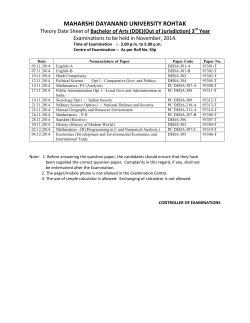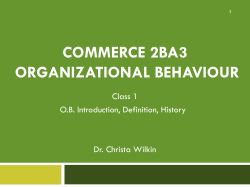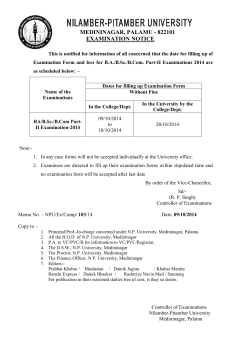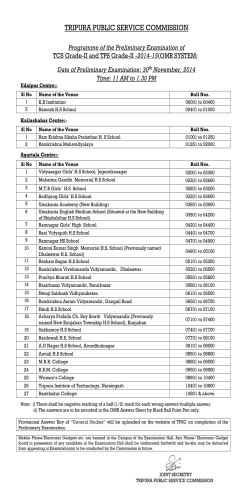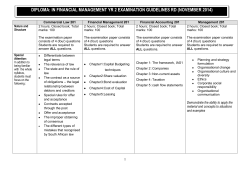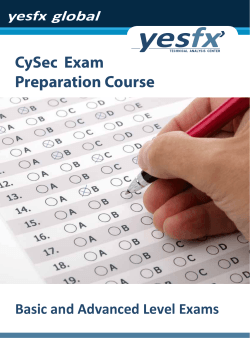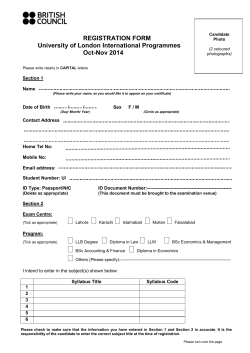
Outline - Undergraduate Commerce
Com4FD3 – Fall 2014 - 1 of 8 Commerce 4FD3 Financial Institutions Fall 2014 Course Outline Finance and Business Economics Area COURSE OBJECTIVE The goal of this course is to help students understand how Canadian financial institutions (FIs) measure and manage their risks. Special emphasis will be given to the management of asset and liability risk of deposit-taking financial institutions. FIs’ perspective on risk is different from other corporations because a major role of FIs is to bear, transform, price and monitor risk. INSTRUCTOR AND CONTACT INFORMATION Instructor: Dr. Sultan M. Awan Office: DSB/313 Email: awan@mcmaster.ca Teaching Assistant Yuchuan Jin jiny36@mcmaster.ca Class Schedule: Friday 2:30 PM ~ 5:20 PM Office Hours: Mon: 5:30 ~ 6:30 PM and by appointment COURSE ELEMENTS Credit Value: Avenue: Participation: Evidence-based: 3 Yes Yes Yes Leadership: Ethics: Innovation: Experiential: Yes No Yes No IT skills: Numeracy: Group work: Final exam: No Yes Yes Yes Global view: Written skills: Oral skills: Guest speaker(s) Yes Yes Yes No COURSE DESCRIPTION In the first part of the course, students will be introduced to the Canadian financial services industry, which comprises of deposit-taking banks, insurance companies, investment banks, pension and mutual funds. We then go through the major risks of financial institutions management: interest rate risk, liquidity risk, market risk and credit risk. We discuss how financial institutions can identify and measure their exposures to each of these risks. In the second part of the course, we focus our attention on the risk management of financial institutions. Regulatory requirements dealing with capital adequacy and deposit insurance will be discussed. Finally, we will talk about the role of securitization and derivative instruments (e.g., forward contracts and swaps) in risk mitigation. www.degroote.mcmaster.ca Com4FD3 – Fall 2014 - 2 of 8 LEARNING OUTCOMES Upon completion of this course, students should be able to to complete the following key tasks: Appreciate the economic challenges and opportunities encountered by Canadian FIs; Understand the risk/return trade-off of FIs’ businesses in bearing, transforming and managing financial risks; Measure and manage FIs’ interest rate risk, liquidity risk, market risk and credit risk; and Assess the implications of national and international regulatory requirements on FIs’ business strategies. REQUIRED COURSE MATERIALS AND READINGS Financial Institutions Management: A Risk Management Approach, Fourth Canadian Edition, by Anthony Saunders, Marcia M. Cornett and Patricia A. McGraw, 2010, McGraw-Hill Ryerson Forcourse contents such as lecture notes, solution of selected chapter-end quantitative problem sets, assignments, and other course related announcements, please visit course webpage on Avenue. http://avenue.mcmaster.ca Texas Instruments BA II Plus financial calculator is recommended for this course. However, any calculator that performs time value of money functions is acceptable. EVALUATION Learning in this course results primarily from lectures, in-class discussions and exercises, home readings, and from assigned problem sets. Students learning and progress in this course will be evaluated on group and individual basis. Final letter grades in this course will be calculated as follows: Assignment #1 Problem Set (Group) 15% Assignment #2 Problem Set (Group) 15% Midterm Exam Material Covered until Week 6 30% Final Exam Material Covered until Week 13 40% 100% Total www.degroote.mcmaster.ca Com4FD3 – Fall 2014 - 3 of 8 Assigned Problem Sets Quantitative problem sets and excel application problems will be assigned during this term; one in pre-midterm period (assignment 1) and one in post-midterm period (assignment 2). The main focus of this evaluation activity is to provide students an opportunity to practice quantitative problems and to prepare well for the exams. You may find some problems challenging. Please do your best. Serious attempts to arrive at the correct answer will be rewarded. You are encouraged to work with your classmates on problem sets. The problem sets and rest of the submission details will be posted on Avenue. Midterm and Final Exam Midterm and final examination will be based on multiple-answers-choice questions. Only selected topics will be included in the readings list for the final exam. The midterm and final are open book exams. Students may use reading material such as lecture notes during the exams. However, PC and any other digital devices are not allowed during the exams. Use of financial calculator is recommended. PLEASE NOTE: 1. There will be NO make-up for any missed evaluation activity including the exams. 2. Where students miss a scheduled evaluation activity for legitimate reasons, the weight for that activity will be distributed across other evaluative components of the course at the discretion of the instructor. 3. If a student misses a lecture for any reason, it is student’s responsibility to obtain class lecture notes and other relevant material from the classmates. 4. NO extra credit work or assignments will be offered in this course. 5. Marks for all pre-final exam evaluation activities will be posted on Avenue. Your final grade should come through official channels. Hence, marks for final exam will not be posted on Avenue. 6. You may contact course instructor or course TA for Questions on course material, evaluation scheme, midterm, and Final Exam. Grade Conversion At the end of the course, your overall percentage grade will be converted to your letter grade in accordance with the following conversion scheme: LETTER GRADE PERCENT LETTER GRADE PERCENT A+ A A- 90 - 100 85 - 89 80 - 84 C+ C C- 67 – 69 63 - 66 60 - 62 B+ B B- 77 - 79 73 - 76 70 – 72 D+ D D- 57 - 59 53 - 56 50 - 52 F 00 - 49 www.degroote.mcmaster.ca Com4FD3 – Fall 2014 - 4 of 8 Communication and Feedback Students that are uncomfortable in directly approaching an instructor regarding a course concern may send a confidential and anonymous email to the respective Area Chair (balvers@mcmaster.ca) or Associate Dean (adbusac@mcmaster.ca): Students who wish to correspond with instructors or TAs directly via email must send messages that originate from their official McMaster University email account. This protects the confidentiality and sensitivity of information as well as confirms the identity of the student. Emails regarding course issues should NOT be sent to the Administrative Assistant. Instructors are encouraged to conduct an informal course review with students by Week #4 to allow time for modifications in curriculum delivery. Instructors should provide evaluation feedback for at least 10% of the final grade to students prior to Week #8 in the term. ACADEMIC DISHONESTY You are expected to exhibit honesty and use ethical behaviour in all aspects of the learning process. Academic credentials you earn are rooted in principles of honesty and academic integrity. Academic dishonesty is to knowingly act or fail to act in a way that result or could result in unearned academic credit or advantage. This behaviour can result in serious consequences, e.g. the grade of zero on an assignment, loss of credit with a notation on the transcript (notation reads: “Grade of F assigned for academic dishonesty”), and/or suspension or expulsion from the university. It is your responsibility to understand what constitutes academic dishonesty. For information on the various types of academic dishonesty please refer to the Academic Integrity Policy, located at www.mcmaster.ca/academicintegrity. The following illustrates only three forms of academic dishonesty: 1. Plagiarism, e.g. the submission of work that is not one’s own or for which other credit has been obtained. 2. Improper collaboration in group work. 3. Copying or using unauthorized aids in tests and examinations. MISSED ACADEMIC WORK Students may request relief from a regularly scheduled midterm, test, assignment or other course component in the following two ways: a. for missed coursework worth less than 30% of the final grade (and/or absences lasting less than 5 days); or b. for missed coursework worth 30% or more of the final grade (and/or absences lasting more than five (5) days c. For missed coursework worth less than 30% of the final grade (and/or absences lasting less than 5 days) www.degroote.mcmaster.ca Com4FD3 – Fall 2014 - 5 of 8 Students must use the MSAF (McMaster Student Absence Form) for their first incidence of missed coursework worth less than 30% for each term. This is an on-line, self-reporting tool, for which submission of medical or other types of supporting documentation is normally not required. Students may use this tool to submit a maximum of one (1) request for relief of missed academic work per term as long as the weighting of the component is worth 29% of the final grade or less. Students must follow up with their course instructors regarding the nature of the relief within two days of submitting the form. Failure to do so may negate the opportunity for relief. It is the prerogative of the instructor of the course to determine the appropriate relief for missed term work in his/her course. If the value of the component is worth 30% or more, students must report to the APO to discuss their situation and will be required to provide appropriate supporting documentation. a) For missed coursework worth 30% or more of the final grade (and/or absences lasting more than five (5) days Students MUST report to the APO to discuss their situation and will be required to provide appropriate supporting documentation. If approved, students will be given access to the MSAF system where they will be required to enter the details of the missed coursework for which they were approved. Students must follow up with their course instructors regarding the nature of the relief within two days of submitting the form. Failure to do so may negate the opportunity for relief. It is the prerogative of the instructor of the course to determine the appropriate relief for missed term work in his/her course. Students who wish to submit more than one request for relief of missed academic work per term cannot use the online MSAF tool without permission. They must report to the APO and discuss their situation with an academic advisor. They will be required to provide supporting documentation and possibly meet with the Manager. The MSAF cannot be used during any final examination period. Regarding Midterm Conflicts Students unable to write a mid-term at the posted exam time due to the following reasons: religious; work-related (for part-time students only); representing university at an academic or varsity athletic event; conflicts between two overlapping scheduled mid-term exams; or other extenuating circumstances, have the option of applying for special exam arrangements. Please see the DeGroote Missed Course Work Policy for a list of conflicts that qualify for academic accommodation. http://ug.degroote.mcmaster.ca/forms-and-resources/missed-course-work-policy/ Such requests must be made to the Academic Programs Office at least ten (10) working days before the scheduled mid-term along with acceptable documentation. Instructors cannot themselves allow students to unofficially write make-up exams/tests. Adjudication of the request must be handled by the Academic Programs Office. www.degroote.mcmaster.ca Com4FD3 – Fall 2014 - 6 of 8 If a mid-term exam is missed without a valid reason, students will receive a grade of zero (0) for that component. Missed Final Examinations A student who misses a final examination without good reason will receive a mark of 0 (zero) on the examination. All applications for deferred and special examination arrangements must be made to the MBA Academic Services Office. Failure to meet the stated deadlines may result in the denial of these arrangements. Deferred examination privileges, if granted, must be satisfied during the examination period at the end of the following term. There will be one common sitting for all deferred exams. Failure to write an approved deferred examination at the pre-scheduled time will result in a failure for that examination, except in the case of exceptional circumstances where documentation has been provided and approved. Upon approval, no credit will be given for the course, and the notation N.C. (no credit) will be placed on the student’s transcript. Students receiving no credit for a required course must repeat the course. Optional or elective courses for which no credit is given may be repeated or replaced with another course of equal credit value. Requests for a second deferral or rescheduling of a deferred examination will not be considered. Any student who is unable to write a final examination because of illness is required to submit the Application for Deferred MBA Final Examination and a statement from a doctor certifying illness on the date of the examination. The Application for Deferred MBA Final Examination and the McMaster University Student Health Certificate can be found on the DeGroote website at: http://mbastudent.degroote.mcmaster.ca/forms-and-applications/ Please do not use the online McMaster Student Absence Form as this is for Undergraduate students only. Students who write examinations while ill will not be given special consideration after the fact. In such cases, the request for a deferred examination privilege must be made in writing to the MBA Academic Services Office within five business days of the missed examination. Special examination arrangements may be made for students unable to write at the posted exam time due to compelling reasons (for example religious, or for part-time students only, workrelated reasons): Students who have religious obligations which make it impossible to write examinations at the times posted are required to produce a letter from their religious leader stating that they are unable to be present owing to a religious obligation. Part-time students who have business commitments which make it impossible to write examinations at the times posted are required to produce a letter on company letterhead www.degroote.mcmaster.ca Com4FD3 – Fall 2014 - 7 of 8 from the student’s immediate supervisor stating that they are unable to be present owing to a specific job commitment. In such cases, applications must be made in writing to the MBA Academic Services Office at least ten business days before the scheduled examination date and acceptable documentation must be supplied. If a student is representing the University at an academic or athletic event and is available at an overlapping scheduled time of the test/examination, the student may write the test/examination at an approved location with an approved invigilator, as determined by the MBA Academic Services Office. In such cases, the request for a deferred examination privilege must be made in writing to the MBA Academic Services Office within ten business days of the end of the examination period. Note: A fee of $50 will be charged for a deferred exam written on campus and a fee of $100 for deferred exams written elsewhere. In cases where the student’s standing is in doubt, the Graduate Admissions and Study Committee may require that the student with one or more deferred examination privileges refrain from re-registering until the examination(s) have been cleared. STUDENT ACCESSIBILITY SERVICES Students who require academic accommodation must contact Student Accessibility Services (SAS) to make arrangements with a Program Coordinator. Academic accommodations must be arranged for each term of study. Student Accessibility Services can be contacted by phone 905525-9140 ext. 28652 or e-mail sas@mcmaster.ca. For further information, consult McMaster University’s Policy for Academic Accommodation of Students with Disabilities. POTENTIAL MODIFICATIONS TO THE COURSE The instructor and university reserve the right to modify elements of the course during the term. The university may change the dates and deadlines for any or all courses in extreme circumstances. If either type of modification becomes necessary, reasonable notice and communication with the students will be given with explanation and the opportunity to comment on changes. It is the responsibility of the student to check their McMaster email and course websites weekly during the term and to note any changes. DETAILS FOR ONLINE COMPONENT In this course we will be using EconLab, the electronic components of this course. Students should be aware that when they access EconLab, private information such as first and last names, user names for the McMaster e-mail accounts, and program affiliation may become apparent to all other students in the same course. The available information is dependent on the technology used. Continuation in this course will be deemed consent to this disclosure. If you have any questions or concerns about such disclosure please discuss this with the course instructor. www.degroote.mcmaster.ca Com4FD3 – Fall 2014 - 8 of 8 Commerce 4FD3 Financial Institutions Fall 2014 Course Schedule Below is a tentative course schedule. As we progress in the course, contents of some of the topics listed below may be modified, if required. Date September 5 Main Topics and Descriptions Introduction: Importance of FIs risk and return trade-off Introduction: Importance of FIs risk and return trade-off September 12 Interest rate risk (I and II): Central bank and interest rate Gap analysis, repricing and duration model Interest rate risk (I and II): Central bank and interest rate Gap September 19 analysis, repricing and duration model Market risk: Value-at-risk, BIS standardized measurement Market risk: Value-at-risk, BIS standardized measurement September 26 Foreign exchange risk: foreign asset and liability position, interaction of interest rates, inflation, and exchange rate Group Assignment 1 due October 3 Credit risk: Individual and portfolio loans analysis October 10 Credit risk: Traditional and Quantitative approaches of credit risk measurements October 17 Midterm Exam (Readings: Chapters 1 – 5, 8 – 12, and 14) Liquidity risk: Liability and asset-side liquidity risk of FIs Liability and liquidity management: Liability and asset-side risk management Mid-term Recess – No Class Liquidity risk and management: Liability and asset-side liquidity and risk management Capital adequacy capital requirement, adequacy, and insolvency risk Futures and Forward contracts: FI use of forward and future contracts to manage interest, FX, and credit risk October 24 October 31 November 7 November 14 November 21 November 28 Dec. 5 - 20 Options and Floors: FI use of options in hedging FX and credit risk Group Assignment 2 due Swaps: FI credit risk concerns related to interest, currency, and credits swaps Final Exam – Scheduled by Registrar Office www.degroote.mcmaster.ca Chapters 1 to 5 1 to 5 8 and 9 8 and 9 10 10 and 14 11 and 12 11 and 12 17 and 18 17 and 18 20 23 24 25
© Copyright 2025

